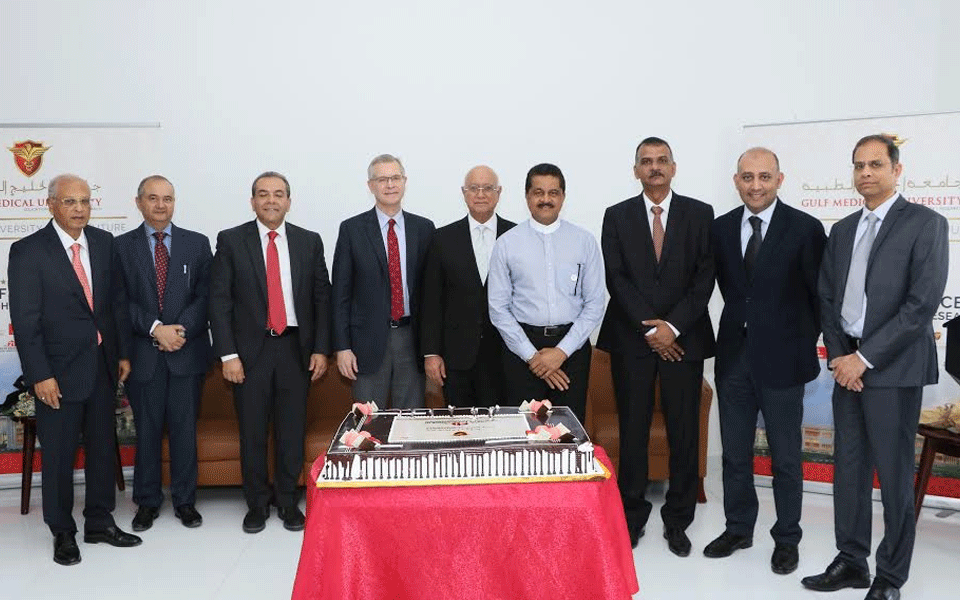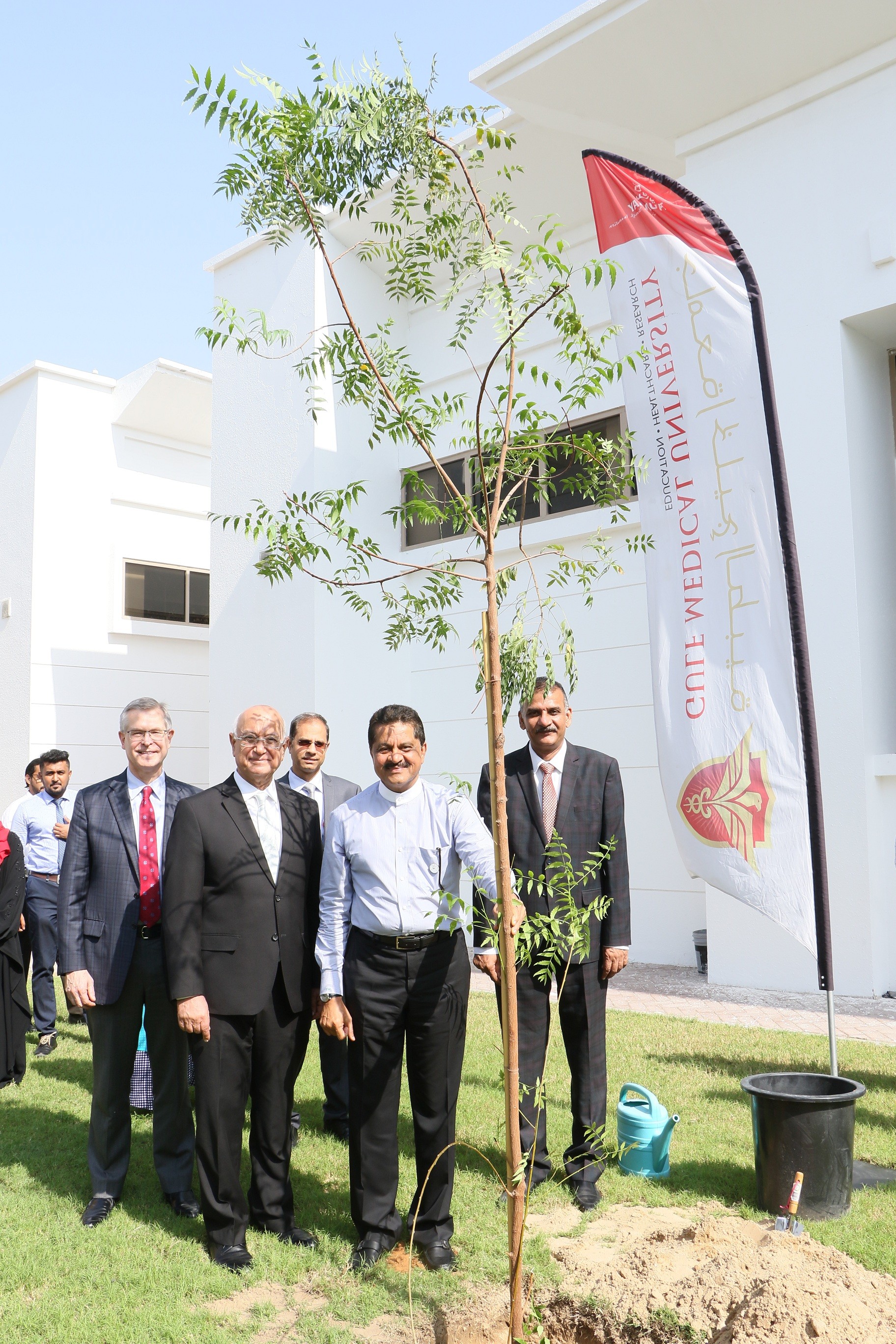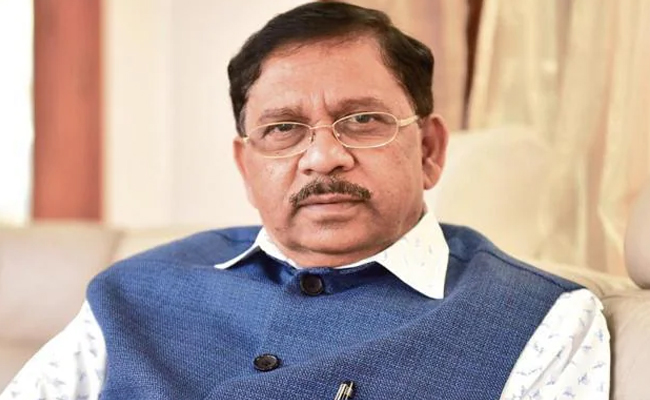Gulf Medical University (GMU), Ajman, the biggest private medical university in the Middle East region celebrated its 21st anniversary with a cake-cutting ceremony and a tree-planting event at the university campus, on 5th November 2019. The ceremony was attended by Dr. Thumbay Moideen – Founder, President Board of Trustees GMU, Prof. Hossam Hamdy – Chancellor of GMU, Prof. John R. Raymond – President & CEO of the Medical College of Wisconsin, USA & Member of the Board of Trustees, GMU, Prof. Manda Venkatramana - Vice Chancellor Academics, the Deans of the colleges of GMU as well as other staff and students.
Addressing the gathering, Dr. Thumbay Moideen said that he was grateful to the Almighty, the rulers of the country and his team at GMU, for the continued success and growth of the University. “The completion of 21 years is a significant landmark for Gulf Medical University, as we transform into a leading Academic Health System delivering futuristic medical education at the same providing state-of-the-art healthcare and leading innovative research.”
Elaborating on the future strategic directions of GMU, Prof. Hossam Hamdy said, “GMU is committed to producing healthcare professionals of the future. We are now moving towards becoming a research-intensive university. The type of research which we are running here in cancer immunology and genetics is a very important area. The science of medical education, focusing on the futuristic views of education is another important area of research at GMU. We have the highest number of publication, in reputed journals, regarding medical education; how to build medical schools and health professionals of the future.”
Prof. John R. Raymond said that he was impressed with the growth of GMU, and its approach to medical education and research. “GMU is a dynamic organization. The quality of the faculty and students are quite outstanding. They are deeply committed to doing things collaboratively and innovatively. The student community here is a fine example of inclusion and diversity, which brings strength to the institution. What impresses me the most is the vision and the leadership of GMU. The University also places a lot of emphasis on inter-professional education, blending real-world skills with modern technology. Besides, there is a remarkable synergy between the academic health centers that constitute the GMU Academic Health System.”
A neem tree was planted in the University campus during the 21st anniversary celebrations, as a symbol of growth and purification.
GMU has collaboration agreements with around 68 top international universities in Europe, United States, Japan and Far East, giving the students opportunities for trainings abroad. Graduate programs are now being offered jointly and in collaboration with the University of Arizona, United States, Virginia Commonwealth University, United States, Medical College of Wisconsin, United States, FAIMER, United States, CenMedic, United Kingdom and Tokyo Medical and Dental College, Japan. GMU also provides merit-based scholarships to students.
Offering a total of 26 accredited programs through its 6 colleges, the University has been at the forefront of attaining international recognitions, some of the recent ones being the College of Medicine’s recent accreditation based on ‘World Federation of Medical Education’ standards, becoming the first in the UAE and the Gulf region to achieve this feat. The Doctor of Pharmacy (PharmD) program offered by our College of Pharmacy was recognized by the Accreditation Council for Pharmacy Education (ACPE), making it the first internationally certified entry-to-practice PharmD program in UAE. Recently, GMU also hosted the prestigious MRCPUK PACES (Practical Assessment of Clinical Examination Skills) exam in collaboration with the Federation of the Royal Colleges of Physicians of the United Kingdom, joining the exclusive list of international PACES exam centers in the region.
Let the Truth be known. If you read VB and like VB, please be a VB Supporter and Help us deliver the Truth to one and all.
New Delhi (PTI): Finance Minister Nirmala Sitharaman on Sunday allocated Rs 2,77,830 crore to the Ministry of Railways for capital expenditure in the financial year 2026–27.
The Budget allocation includes the construction of new lines and the purchase of locomotives, wagons, and coaches, among other works.
The ministry had received Rs 2,52,000 crore in FY 2025–26. The current allocation for the upcoming financial year is 10.25 per cent higher, making it the highest ever. Besides, the ministry will get Rs 15,000 crore from Extra Budgetary Resources, the document showed.
According to the Budget document, the railways’ total earnings are projected at Rs 3,85,733.33 crore, while expenditure is estimated at Rs 3,82,186.01 crore, resulting in a surplus of Rs 3,547.32 crore at the end of the financial year.
"Since the railways' earnings are too meagre to fund asset creation and support new works, it receives funds from the government. Accordingly, the ministry has been allocated Rs 2,77,830 crore to undertake activities such as laying new lines, converting narrow gauge to broad gauge, and constructing double lines on single-line routes," a railway official said.
The Budget document has earmarked funds from the Rs 2,77,830 crore allocation for various construction and asset creation projects. These include Rs 36,721.55 crore for new lines, Rs 4,600 crore for gauge conversion, Rs 37,750 crore for doubling, Rs 52,108.73 crore for rolling stock (locomotives, wagons, etc.), and Rs 7,500 crore for signalling and telecom, among others.
The allocation under the signalling and telecom head is significant as the automatic train protection system, Kavach, falls under this department. The ministry has laid strong emphasis on expanding Kavach coverage across the rail network.
The document also presents the actual earnings and expenditure of the railways in 2024–25. During the year, railways earned Rs 3,35,757.09 crore and spent Rs 3,32,440.64 crore, recording a surplus of Rs 3,316.45 crore. The budgetary allocation for the year stood at Rs 2,51,946.56 crore.
"As far as FY 2025–26 is concerned, the actual figures for earnings and expenditure will be available only after the financial year ends,” an official said, adding that largely earnings and expenses are on expected lines with minor changes.
Out of the total expenditures of the railways, the biggest share goes on paying pensions to its employees.
According to Budget documents, expenditure on pensions was Rs 58844.07 crore in 2024-25, which is expected to rise to Rs 74500 crore in 2026-27.


.JPG)




